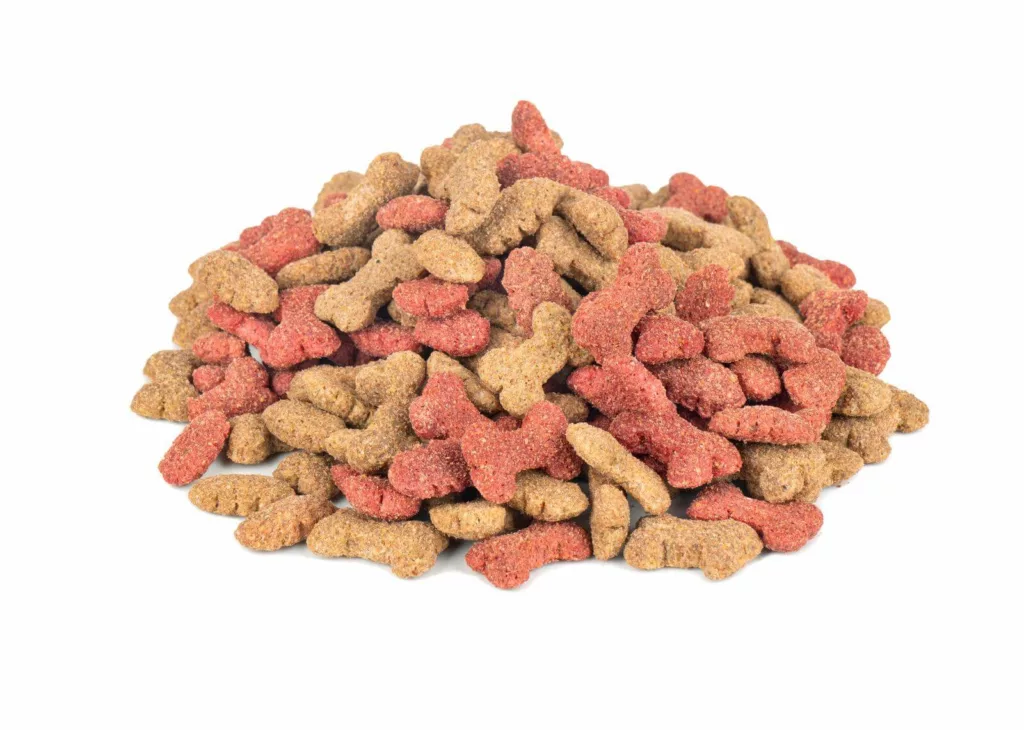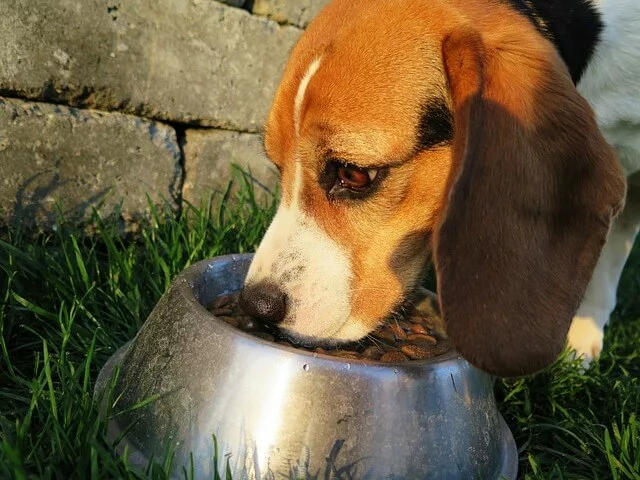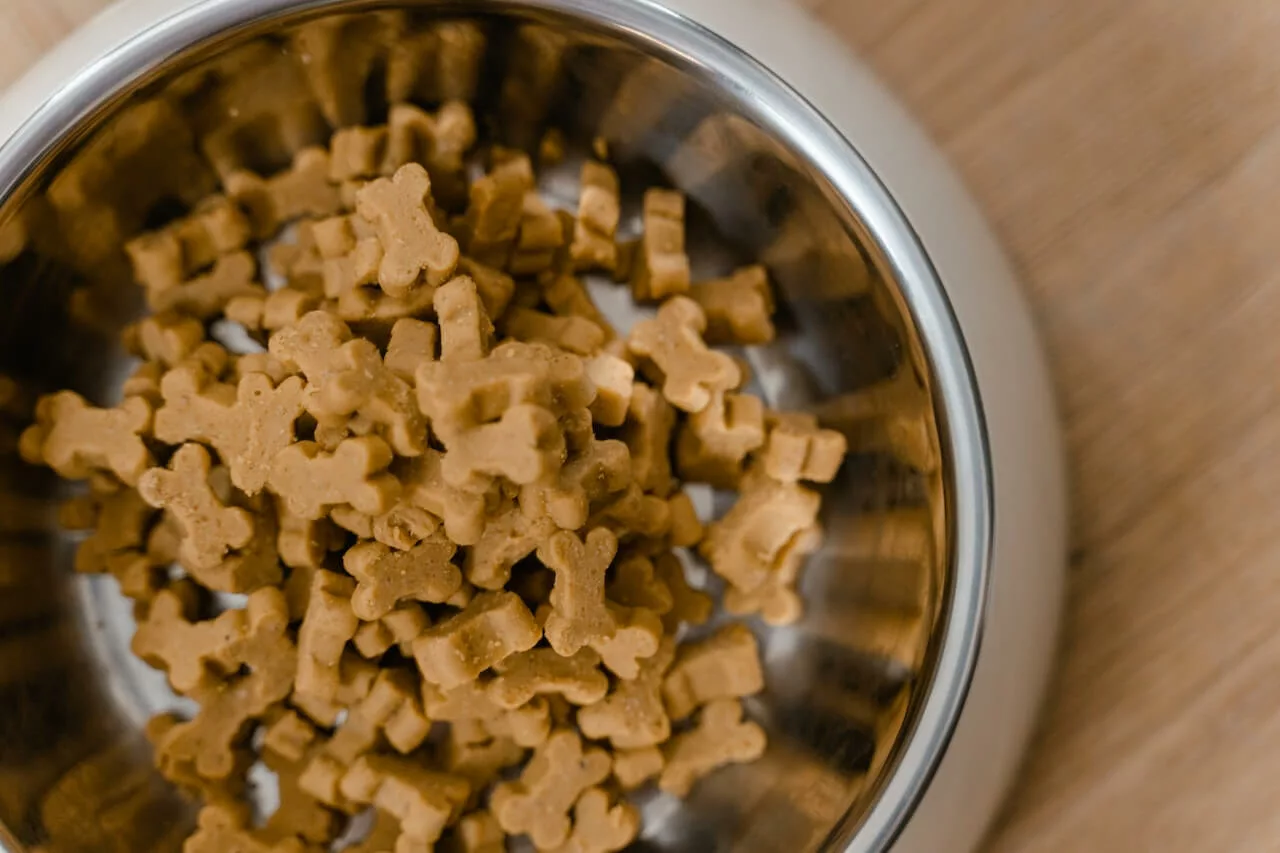If you have a dog with sensitivity for food ingrediencies, you may be wondering what kind of food you should feed them. Food for dogs with sensitive stomach is specially formulated to be easy on your dog’s digestive system.
What is a sensitive stomach in dogs?
A sensitive stomach is a term used to describe a dog’s digestive system that is easily upset by certain types of food or ingredients. This can be news to pet owners since most dogs can eat almost anything without worry. A dog with a sensitivity for food ingrediencies can experience bowel problems that can lead to diarrhea, vomiting, and chronic constipation. It’s worth noting that stomach sensitivity isn’t a medical diagnosis in itself, but instead a symptom of an underlying issue that may require attention by a vet.
What causes sensitive stomach in dogs?
Stomach issues in dogs can have various causes. It can be due to genetics, which means your pooch is more susceptible to get sensitive stomach and various ailments related to it. It can also due to consuming foreign objects that can block the bowel system, leading to vomiting, loose stool, and constipation. Dogs with allergies and food intolerances can also cause sensitive stomachs in dogs, and it might occur due to the stomach taking a long time to digest food, leading to the accumulation of gas and causing bowel problems in dogs.
Symptoms of a sensitive stomach in dogs
It’s essential to know the symptoms of a your dog food sensitivity to diagnose the condition early and prevent further health problems. The most common signs of sensitive stomach include vomiting, diarrhea, and gas-related issues. Your dog might also experience constipation, a loss of appetite, and weight loss if the condition persists. If you have noticed any of these symptoms in your dog, it’s important to visit a vet for diagnosis and treatment options.
The Benefits of Dog Food For Sensitive Stomach

Several benefits come with feeding your dog sensitive stomach food. First, it can help reduce the chances of your dog having an upset tummy or vomiting. Additionally, it can help with weight control and make it easier for your dog to absorb nutrients from their food. Finally, sensitive stomach food is often made with high-quality ingredients that can help improve your dog’s overall health.
When to Feed Your Dog Sensitive Stomach Food
If your dog has an occasional upset tummy, there’s no need to switch to special food permanently. However, if your dog has chronic bowel issues, sensitive stomach food may be a good option. You should also consider switching to special food if your dog is overweight or has trouble absorbing nutrients from their food.
How to Choose the Right Sensitive Stomach Food
There are a few things you’ll want to keep in mind when choosing a sensitive stomach food for you dog. First, make sure the food is appropriate for your dog’s life stage. For example, puppies and senior dogs have different nutritional needs. Second, choose a food that is made with high-quality ingredients and does not contain fillers or artificial additives. Finally, consult with your veterinarian to find a food that is right for your dog’s unique needs.
What should you look for in dog food for sensitive stomachs?

1. Limited Ingredient Diets
One of the first things to consider when looking for dog food for dogs who suffer from sensitive stomachs is what the dog food contains. It is often best to choose a dog food that has a limited number of ingredients, especially if your furry friend has a severe allergy or intolerance to certain foods. Look for dog food brands that use high-quality protein sources and carbohydrates, such as chicken, lamb, or sweet potatoes, and stay away from artificial preservatives, colors, and flavors.
2. Low-Fat and Easily Digestible Proteins
Dogs with food sensitivity often have difficulty digesting high-fat foods and animal proteins. Therefore, it is recommended to choose a dog food that has lower fat content and easily digestible proteins, such as turkey, fish, or eggs. Foods that are high in fiber can also help with digestive issues, and some brands offer special formulas for upset stomachs, which contain bowel enzymes and probiotics.
3. Grain-Free Options
Some dogs with bowel trouble may have allergies or sensitivities to grains, such as wheat, corn, or soy. Therefore, grain-free options are an excellent choice for these dogs. Grain-free dog food is often made with alternative sources of carbohydrates, such as sweet potatoes or peas, and may contain more high-quality proteins, such as duck, venison, or salmon.
Dry Vs. Wet Dog Food
Whether to choose wet or dry dog food for your furry friend depends on several factors, such as their age, breed, and overall health. For dogs with sensitivity for food ingrediencies, wet food may be more suitable as it contains more moisture, which can help with digestion. Wet food is also easier to chew and more palatable for older dogs or those with dental problems. However, wet food is more expensive than dry dog food and spoils more quickly.
Consulting with Your Veterinarian
Lastly, if you have tried different brands of food and your furry friend is still having gut issues, it may be time to consult with your veterinarian. They can perform tests to determine if your dog has food allergies or intolerances and help you find the right type of diet for their specific needs.
How can you transition your dog to a sensitive stomach diet?

Determine Your Dog’s Triggers
To start your dog’s transition to a sensitive stomach diet, you need to figure out what triggers their upset stomach. Common culprits include certain ingredients like whole grains, soy, or dairy, certain types of proteins, or even stress. If you’re not sure, try keeping a food diary or take note of when your dog seems to experience discomfort.
Choose the Right Food
Once you’ve identified what triggers your dog’s bowel issues, it’s time to choose the right food. Look for a high-quality sensitive skin and stomach food, limited-ingredient diet that avoids any ingredients your dog can’t tolerate. Check the ingredient list carefully – sometimes certain ingredients can be hidden under different names. And don’t forget to work with your veterinarian to ensure the food you choose meets all of your dog’s nutritional needs.
Transition Slowly
Switching your dog’s food too quickly can cause bowel trouble – the last thing you want! Start by mixing small amounts of the new food with the old, slowly increasing the new food and decreasing the old over 7-10 days. This will give your dog’s gut system time to adjust, reducing the risk of any tummy troubles.
Monitor Your Dog’s Response
As you transition your dog to their new diet, keep a close eye on their behavior and digestive system. If your dog seems uncomfortable or experiences diarrhea or vomiting, slow down the transition or consult your veterinarian. It’s also important to note that it may take a few weeks for you to see any improvement in your dog’s overall health. Be patient and give the new diet time to work its magic.
Consider Adding Probiotics
Adding probiotics to your dog’s nutrition can help promote healthy digestions, keep their gut flora balanced, and support overall health. Look for a high-quality supplement that’s specifically designed for dogs, and follow the recommended dosage carefully.
What else can you do to help your dog with food sensitivity?

Brush up on your dog’s nutrition requirements
If your dog has a sensitive stomach, their dietary requirements may need to be modified. Your dog needs a diet that suits their specific age, size, and health needs. Additionally, your pup may require a diet that is easier to digest, such as wet food, in case dry foods tend to trigger symptoms. Speak to your veterinarian or pet nutritionist for individualized advice on the right kind of nutrition, meal plan, feeding frequency, and portion sizes for your furry friend.
Introduce new foods gradually
Sudden changes to your dog’s food could contribute to gut problems and aggravate an existing sensitive stomach condition. First, start by gradually introducing new foods to your dog’s diet so that their stomach can adjust easily. This may involve mixing small amounts of new food into your dog’s usual meals until their system adapts to it. Also, avoid feeding your pup table scraps or food leftovers as these contain different ingredients that may irritate their bowel system.
Make conscious food choices
It is essential to be mindful of your dog’s dietary needs and to select foods that do not contain artificial preservatives, colors, or flavors, fillers, or other harmful additives. Look for dog food brands that have fewer ingredients, high-quality protein sources, and natural preservatives. Moreover, to prevent dehydration, make sure that your dog has access to clean water at all times, especially during meals and after exercising.
Try out food supplements
Sometimes, providing your dog with supplements can enhance their bowel system and improve their nutrient absorption. Aloe vera, probiotics, and prebiotics are examples of dietary supplements that can benefit dogs with irritable bowels. They reduce inflammation in the gut and introduce helpful bacteria that strengthen the digestive tract. Always remember to speak to your vet before introducing new supplements to your dog’s diet.
Offer low-fat treats
Several commercial treats are available to reward and entertain your dog, but many of these snacks contain high levels of fat. Eating a large amount of fat can trigger digestive upset and lead to further complications. If you wish to offer your dog a treat, consider buying low-fat, healthy snacks, such as carrot sticks, apples, and unseasoned cooked chicken pieces.
Best Dog Food for Sensitive Stomachs
Dogs with irritable bowels can develop gut issues such as vomiting, loose stool, or constipation. It’s important to pay close attention to your dog’s overall health and work closely with your veterinarian to develop a nutritional plan that meets their specific needs.
Ideal Foods for Dogs with Sensitivity For Food Ingrediencies

Several dog food brands such as Blue Buffalo Basics Limited Ingredient Diet and Purina Pro Plan Sensitive Skin and Stomach are formulated specifically for dogs with sensitivity for food ingrediencies. These foods contain limited ingredients and omit unnecessary additives, such as wheat and dairy, that can cause digestive upset. Wet dog food can also be a good option to consider since it contains more water, making it easier for dogs with irritable bowels to digest.
Best Food For Dogs With Stomach problems
- Diamond Care Sensitive Stomach Formula for Adult Dogs.
- Hill’s Science Diet Sensitive Stomach and Skin Adult Dog Food.
- Purina Pro Plan Adult Sensitive Skin and Stomach.
- Wellness Core Digestive Health.
- Royal Canin Veterinary Diet Gastrointestinal Low Fat Kibble.
Homemade Dog Food Recipes for Sensitive Stomachs
Homemade food that includes proteins such as lean chicken, turkey, or beef, along with steamed vegetables like green beans, carrots and brown rice, can be a great alternative for dogs with severe digestive issues. Ensure that the proportions of nutrients are appropriate for your dog’s size and breed. Some of the commercial dog food provides Vitamin E & Omega-6 fatty acids when you make homemade dog for, try to add those ingredients.
How to Properly Feed Your Furry Friend With a Sensitive Stomach
Having a dog is one of the most rewarding experiences. From playing fetch in the park to cuddling on the couch, our four-legged friends bring us so much joy. But If your dog is experiencing digestive discomfort, it can be difficult to know what type of food will keep them healthy and nourished. Luckily, there are plenty of tips and tricks out there that make feeding your furry friend with a sensitive stomach easy and stress-free!
The Right Diet: The first step in properly nourishing your pup with a sensitive stomach is to choose the right diet. There are countless pet food options out there, but you want to make sure you’re choosing one that’s specifically designed for dogs with sensitivity for food ingrediencies. These diets tend to be lower in fat, higher in fiber, and free from common allergens like wheat or dairy. And don’t forget about hydration—your pup needs plenty of water throughout the day!
Feed Less Frequently: Dogs with sensitivity for food ingrediencies often have difficulty digesting large meals at once. To help your pup feel more comfortable after eating, try feeding them smaller meals throughout the day instead of one big meal. This will help their digestive system break down food more easily and reduce any discomfort they may experience afterward.
Be Mindful Of Treats: Treats are an important part of maintaining a healthy relationship with your furry friend, but if they have a sensitive stomach it’s important to be mindful about what kinds of treats you give them. Avoid treats that contain artificial flavors or preservatives as these can upset their delicate digestive system. Instead, opt for natural treats made from fresh fruits and vegetables or high-quality kibble.
What is the difference between sensitive stomach dog food and regular dog food?
Sensitive stomach food and regular dog food differ in their ingredients and nutrient composition. Sensitive stomach food is specially formulated to be more easily digestible for dogs with gut issues such as vomiting, loose stool, or constipation. It typically contains limited sources of protein, fiber, and fat, and excludes certain ingredients like wheat, soy, dairy, and corn. On the other hand, regular dog food has a wider range of ingredients and nutrients, and is formulated to meet the nutritional needs of most dogs without any specific bowel issues. It is important to choose the right dog food brand based on your dog’s specific breed and dietary needs and follow your veterinary’s recommendations.
What type of dry food is best for dogs with sensitive stomachs?
Dogs with sensitive stomachs require a carefully selected, high-quality dry food diet to help them maintain optimal health and prevent gastrointestinal issues. The best dry food for dogs with sensitive stomachs should contain limited ingredients, avoiding unnecessary additives such as wheat, soy, and dairy products. It should also provide highly digestible proteins from sources like lamb, chicken, or fish, a moderate amount of fiber, healthy fats, and beneficial probiotics. For instance, brands such as Blue Buffalo Basics Limited Ingredient Diet, Hill’s Science Diet Sensitive Stomach & Skin, and Purina Pro Plan Sensitive Skin and Stomach checks all these boxes and are formulated specifically for dogs with sensitive stomachs. Nonetheless, consult your veterinarian first, as he/she can find the best dry food for your specific dog based on their breed and health status.
Aside from trying foods for dogs with upset stomach issues, how can you help your dog feel better?
In addition to trying dogs special food for upset stomachs, here are some concrete things you can do at home to help alleviate your dog’s discomfort:
- Rehydration: One of the most important steps is ensuring that your dog stays hydrated. Provide plenty of fresh water and consider using electrolyte solutions like Pedialyte. Ice cubes made of chicken or beef stock can also encourage drinking.
- Medication: There are several over-the-counter and prescription medications that can help alleviate your dog’s stomach stress. Probiotics and digestive enzymes can help promote healthy digestion, while over-the-counter medications such as Pepcid AC, Imodium, and Kaopectate can help ease symptoms.
- Diet changes: Switching to a limited ingredient diet or adding boiled chicken and rice to your dog’s regular food can help calm their bowel system.
- Rest: Resting and limiting your dog’s activity when they are experiencing gastrointestinal distress will help them feel better much quicker.
- Veterinary examination: If your dog’s symptoms persist or worsen, it’s important to bring them in for a veterinary examination. We can perform tests to identify potential infestations or infections and provide more targeted treatment.






